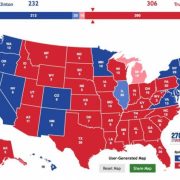The Electoral College Could be the Next Black Swan
A campaign to recount the electoral votes is underway in three states, Pennsylvania (20), Wisconsin (10), and Michigan (16).
If successful, it could overturn the presidential election in favor of Hillary Clinton.
If that occurs, the consequences for financial markets would be extreme.
Volatility across all asset classes would explode. The Dow Average ($INDU) would open down 1,000 points.
Domestic US ?New World Order? stocks would instantly give up their recent 20%-25% gains. US Treasury bonds (TLT) would rocket by ten points.
The US dollar would utterly collapse against the Euro (FXE) and the Japanese yen (FXY). Gold (GLD) would soar by hundreds of dollars.
Have I got you interested now?
Personally, I give this less than a 1% chance of taking place.
But, after a year when Britain voted itself out of the European Community, Donald Trump won the presidential election, and the Chicago Cubs took the World?s Series, I have learned to never say never the hard way.
Russia has been interfering with the US presidential election since it started a year ago. A steady drip, drip, drip of hacked Democratic emails appeared in the media daily.
Some 225 million pro Trump fake news posts sent by Eastern European sources were opened by American voters.
This and other inconsistencies has prompted the Green Party to petition for recount votes in Wisconsin.
Trump won by a wafer thin 73,703 vote margin out of 2,700,822 votes cast in the Badger State. A hack of a single county could change the results. The Green Party is paying the $5 million cost of a physical recount.
Similar efforts are underway in Michigan, where Trump won by a miniscule 11,612 votes out of 4,547,998 cast, and Pennsylvania, were he was ahead by a scant 57,588 votes from 5,745,002 cast.
State officials will be working double time to assure that accurate results are available by the time the Electoral College votes on December 19.
If there IS a correction in these three states of only 142,903 votes, Clinton would win the Electoral college by 278 votes to 262.
And that is 142,903 votes out of a total of 126,394,468 cast nationally.
This is not that unlikely, given the thin margin.
There is still another path open to a Clinton presidential win.
The founding fathers, largely members of an elite landed aristocracy, feared the possibility of an uneducated rabble using democracy to take over the government in a future election.
So they created the Electoral College, which requires electors to only vote for ?reasonable? men. Electors may view the popular votes as advisory only, and may vote for anyone they want. This was further reaffirmed by a 1952 Supreme Court Ruling.
These are known as ?faithless? electors.
In 22 elections in American history, some 179 faithless electors voted for candidates against their party?s wishes.
During the 1836 election, all 23 of Virginia?s electors refused to vote because their party?s candidate, Richard M. Johnson, was romantically involved with one of his black slaves.
During modern times, one faithless elector turns up in every election, usually as a protest vote.
In the 2004 election, a Minnesota elector pledged to John Kerry voted for the wrong candidate.
In 2000, a Washington DC Al Gore elector refused to vote at all.
In 1968, a North Carolina elector pledged to Richard Nixon voted for American Independent Party segregationist George Wallace.
Electors are career party loyalists chosen for their reliability. Going against voters? wishes results in a lifetime party ban. So it?s rare that we see more than one per election. Electors very rarely give up power and influence over principals.
However, this year is different.
With virtually the entire Republican Party establishment opposed to Donald Trump, and with the president elect already turning over century long Republican policies, we may see more than the usual number of faithless electors.
And it would not be a stretch for some Republican electors in all 50 states to view Trump as not a ?reasonable? man, especially women and minorities.
They already have their excuse. Hillary Clinton is now winning the popular vote by over 2 million votes.
If Clinton wins two out of three of the states above, and picks up a handful of faithless electors, she could still win, by 271 votes to 269. A 270-270 tie goes straight to the new Republican House of Representatives, which would certainly elect Trump.
This is a highly unlikely outcome, but not impossible. If Trump needed an inside straight to win the election, Hillary needs two inside straights back to back to pull this off.
But it is one reason I plan to run a long volatility position going into the Electoral College vote, and expect to be 100% in cash before the actual date.
It could also be why the Volatility Index (VIX) was modestly ticking up last week when the recount story started gaining traction, even though stocks were still rising.
It's been one of the crazy years. Why change now?
Just ask the Cleveland Indians.



